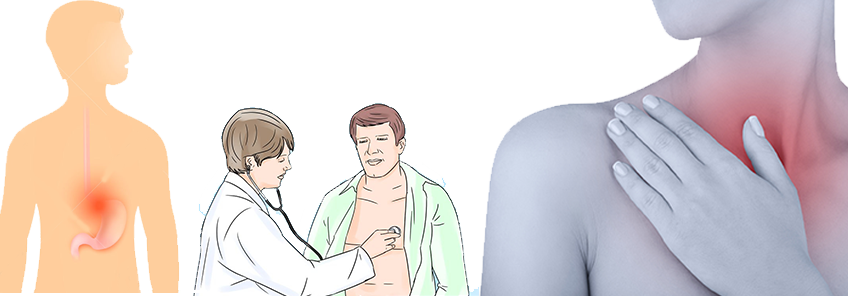Acid Reflux Disease

- Decreased tone of LES is the main reason for GERD.
- It can occur due to excessive smoking, alcohol consumption, caffeine intake and disease called scleroderma.
- Various medications also cause or worsen GERD important one are – nitrates, calcium channel blockers, progestin
- Conditions that increase the overall stomach volume and pressure can cause GERD like large meals, pregnancy, obesity, fluid accumulation inside the abdomen, and tight clothing, bending over can also lead to GERD.
- A hiatal hernia, a condition in which part of the stomach moves above the diaphragm, a muscle that separates the chest and abdominal cavities) can also lead to reflux.
- heartburn or a burning pain in the chest,
- feeling that food is stuck behind the breastbone after it is swallowed and
- nausea after eating.
- the bringing up of the food into the mouth or regurgitation can cause sourness in the mouth.
- reflux of the stomach contents into the throat and respiratory passage can cause cough, pharyngitis, bronchitis and pneumonia.
- difficulty in swallowing the food, hiccups, hoarseness or change in voice, excessive belching and sore throat are other common symptoms of GERD.
- severe GERD can lead to erosions in the inner lining of the esophagus which can cause bleeding.
- Narrowing of the food pipe by strictures. Repeated burning of the lining of the stomach leads to scar formation that can narrow the foodpipe causing food to get stuck.
- Development of esophageal ulcer from severe damage to the lining by the acid. It can bleed and cause pain during swallowing.
- Development of Barrett’s esophagus which increases the risk of cancer and needs endoscopy to monitor the progression of the disease.
When we eat food, it travels through the mouth to the food pipe (esophagus) and then to the stomach. Once in the stomach, food cannot come back up into the esophagus under normal conditions because of the presence of the lower esophageal sphincter (LES). LES is a group of fiber muscle rings at the lower end of the food pipe which acts as a one-way valve. In normal condition, it is tightly constricted and opens or relaxes only when we swallow food. When the sphincter becomes incompetent or doesn’t close properly, the acidic contents of the stomach leak into the esophagus. This condition is known as reflux and can irritate and damage the inner lining of the esophagus leading to gastro-esophageal reflux disease (GERD) or acid reflux disease. Population-based studies have shown that up to 15% of individuals have the symptoms of reflux at least once a week and 7% have symptoms daily.
Causes of GERD
What are the symptoms of GERD?
Complication of GERD
How is GERD diagnosed?
GERD is diagnosed based on the signs and symptoms reported by the patients. Health Care Providers may consider additional diagnostics when the symptoms get complicated or persist for a long time, or there is no response to therapy. In such cases, an endoscopy may be performed which helps to visualize the inner lining of the esophagus, stomach, and small intestine by inserting a small camera that down the throat. Esophageal manometry is another test which is used to measure the pressure inside the lower part of the esophagus.
How is GERD treated?
The goal of the treatment is to provide relief from symptoms and heal erosive lesions and complications if any. Mild symptoms can be managed by weight reduction, sleeping with the head of the bed elevated by about 4-6 inches and elimination of the factors that increase stomach pressure. Patients should not smoke and should avoid consuming fatty foods, coffee, chocolate, alcohol, mint, orange juice and certain medicines like aspirin, ibuprofen, naproxen, anticholinergic agents, calcium channel blockers and smooth muscle relaxants. You should avoid eating heavy meals and consuming a lot of liquids with meals. Preferred painkillers for those suffering from GERD are acetaminophen and paracetamol.
For treating mild cases of acid reflux disease, health care providers may use drugs like cimetidine and ranitidine. These drugs help to reduce the acid secretion in the stomach. Proton pump inhibitors like pantoprazole, omeprazole, lansoprazole, and esomeprazole are useful in symptom relief and are commonly used in combination with over the counter antacids syrups. Patients are recommended to take these drugs 15-30 minutes before daily meals. Healthcare providers may recommend anti-reflux surgery for those patients with persistent symptoms even after changes in lifestyle and medicines.



Send us your feedback on this article